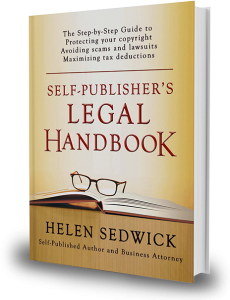
Note from Jane: Today’s guest post is by attorney Helen Sedwick (@helensedwick), an attorney licensed to practice in California only. She is the author of Self-Publisher’s Legal Handbook.
This information is general in nature and should not be used as a substitute for the advice of an attorney authorized to practice in your jurisdiction.
Most writers don’t realize that their memoir, short story collection, children’s book, or novel could mean money in their pockets, even if sales are disappointing.
Suppose you spend $5,000 hiring editors, designers, and other freelancers to publish your book. At the end of the year, you’ve made $2,000 in sales, which you offset with $2,000 of expenses. Can you deduct the remaining $3,000 from your “day job” income and reduce your income taxes?
Yes, if you treat your writing as a business and not a hobby.
U.S. tax code encourages new businesses by permitting entrepreneurs to offset losses from one business from other income as long as the owner has a serious intent to operate the business at a profit. The IRS wants you to succeed, so they can tax your income later.
For a long time, the IRS followed the rule that an income-producing activity was considered a hobby unless it showed a net profit during three out of five years. (If your writing is a hobby, then you may deduct book-related expenses only from book-related income.)
In practice, the hobby rule is not that strict. If you have a serious intent to make a profit from your writing (and quit your day job), a little advanced planning and discipline will help convince the IRS you’re an entrepreneur.
Treat your venture as a business.
Set up a website and advertise. Print business cards and bookmarks. Promote yourself and your book on social media and other venues. Hire experts to advise you. If you don’t treat your writing as a business, no one else will.
There is no need to incorporate or form a business entity. Your business is just as legitimate as a sole proprietorship. Maintaining an entity is simply too expensive, unless you are making $5,000 or more in net income. In that case, don’t worry about hobby rules, but discuss forming an entity with a tax professional to save on self-employment taxes.
Give your business a name.
Having a name helps you and others separate the business from your personal activities. File a Fictitious Business Name Statement (also called a DBA, doing business as, filing) with your local county. I suggest using a service, such as the DBA Store.
Obtain a Federal Employer Identification Number (EIN).
Even if your business is a sole proprietorship and you never have employees, get a separate EIN, the equivalent to a Social Security Number for your business. Be sure you go directly to the IRS website. Sham sites that look like the IRS site are popping up every day. They ask for your Social Security Number, mother’s maiden name, birthday—all the tools for stealing your identity. Don’t use them!
Apply for a resale certificate.
Unless you live in a state that does not charge sales tax, obtain a resale certificate, sometimes called a seller’s permit. Put the certificate in the name of your company and use your new EIN.
Find out if you need a local business license.
Many cities and counties require some businesses to obtain a business license. Search for “business license” and the city and county where your business is located. The Small Business Administration website has helpful links.
Invest time and effort into making a profit.
Attend conferences, and even better, speak at them. Join and host readings. Arrange school visits. Keep working on new books. Pitch new projects.
Follow tax rules.
- If in any calendar year you pay an independent contractor (other than a corporation) $600 or more for services or $10 or more in royalties, ask the freelancer for a W-9 and report the payments on a 1099-MISC and the equivalent state form. This does not apply to payments to a corporation such as BookBaby, CreateSpace, or Lightning Source.
- Report your business income and expenses on a Schedule C. If you have kept separate financial records, this is easy.
- If your net income (gross revenues less deductions) from writing and self-publishing is $400 or more in any year, you may be required to pay self-employment tax on that income. If taxes on that income exceed $1,000 per year, you may be required to pay quarterly estimated taxes. Once you have reached this level of success, it’s time to consult a tax professional.
Separate personal finances from business finances.
Set up separate bank accounts and credit cards to cover business income and expenses.
Don’t jump the gun.
Wait until you have reasonable writing income before “launching” the business for tax purposes. Limit your deductions to those related to your self-published book or freelancing efforts. If you try to deduct ten years of writing conferences, you are inviting IRS scrutiny.
Maintain good business records.
In tax audits, more people are nailed for losing receipts than for cheating. If you don’t have a file cabinet (real or virtual) dedicated to your writing and self-publishing business, then get one. Invest in a simple business accounting software program.
Keep all records for seven years. Some people say three, but I suggest seven years to support your position that writing is your business.
What records to keep:
- receipts
- royalty statements
- sales slips for direct sales (the ones you make at conferences and readings)
- appointment books
- brochures, business cards and handouts from conferences
- manuscript critiques
- thank-you notes from libraries or schools after readings
- fan email
- contest entries and notifications
- correspondence with freelancers, whether or not you hire them
- letters from agents and publishers, including rejections
- bank and credit card records
- printouts of PayPal summaries
- W-9s and 1099s
- sales tax returns
Final note
This tactic won’t work forever. If you have too many years of losses, the IRS is likely to question you or audit your returns. So don’t go overboard.
This nitty-gritty is the unromantic side of writing. But take the time to do it right, and you could save enough taxes to enjoy several lovely, romantic dinners, if not a wonderfully passionate vacation.
Disclaimer: Helen Sedwick is an attorney licensed to practice in California only. This information is general in nature and should not be used as a substitute for the advice of an attorney authorized to practice in your jurisdiction.
Note from Jane: I highly recommend the Self-Publisher’s Legal Handbook. I received an advance copy and found the information useful and essential for just about any author. Click here to learn more and download a sample.
Helen Sedwick is a business lawyer with 30 years of experience assisting clients in setting up and running their businesses legally and successfully. Her clients include entrepreneurs such as wineries, green toy makers, software engineers, and writers. She is the author of Self-Publisher’s Legal Handbook.


Helen, this is very helpful. Might I ask a question? I’ve declared myself as a self-employed fiction author and also I am a copy editor. Is it true that if your self-employment does not make a profit in 5 years the IRS will not allow you to declare your expenses against income any more? Is there a limit on how long you can run your business at a loss? Thanks!
Paula, The is no set rule on how long you may deduct losses from your writing endeavors from other income. The longer you claim the deduction and the more you deduct, the greater the likelihood the IRS will question whether your writing is a business. If you can demonstrate serious intent to make a profit from writing, you should be able to go past 5 years. But it’s important to treat your writing as a business and to keep records. If you are also copy editing (and can claim that your writing efforts and expenses are important for giving you credibility as a copy editor), then I think you have an easier case. IRS is on the look-out for activities which are traditionally seen as hobbies, such as writing, arts and crafts, and music. The big hobby loss spenders (and the ones the IRS really watches) are horse breeders and race car drivers. Copy editing is not typically a hobby.
terrific post, Helen. Even as a UK-based author, I found this very useful. I wonder if there is such a book/resource for UK authors?
[…] U.S. tax code allows new businesses—including self-pub authors—to offset losses from one business from other income as long as you have serious intent to operate at a profit. […]
Thank you, Helen! I suspect I’m not the only author whose income is cobbled together from many sources. Definitely will have to look further into this.
This is so long overdue! I couldn’t hit “buy” fast enough :). Plus I live in California. Thank you, Helen.
Helpful article, Helen. I’m curious. Are you suggesting that authors making money incorporate as an S-corp to save on self-employment taxes?
Heather, If you ask an attorney a question, her favorite answer is “it depends.” This is one of those cases. It depends.
Some people suggest that a writer making significant net income set up an S-corp or an LLC taxed as a S-corp to save on self-employment taxes. I don’t think it makes sense unless the writer is confident he or she will be netting at least $20,000 a year, and even then, it’s a controversial approach. A writer making that level of income should consult an accountant or attorney. It’s a problem of success, which is a good problem to have.
[…] by Jason Mrachina / Flickr Note from Jane: Today’s guest post is by attorney Helen Sedwick (@helensedwick), an attorney licensed to practice in California only. […]
hm, my tax professional highly recommended the exact opposite, stating the IRS deems you a business for any royalty over $10 and therefore you cannot claim to be a hobby as there is the ‘intent to sell.’
Now I have started the legal business
Your tax professional may mean as soon as you make royalties over $10, your are deemed a business for purposes of taxing that income. But the rules for deducting expenses as if you were a business are different and tougher to meet.
[…] Sedwick on Jane Friedman What Every Self-Published Author Needs to Know About Taxes “Most writers don’t realize that their memoir, short story collection, children’s book, […]
There is another angle to consider: municipal taxes. Where I live, the city taxes businesses, but there is no tax on royalties. So going the business route would save money with Uncle, but cost you with the city. You’d have to figure out which number was bigger.
Richard, good point.